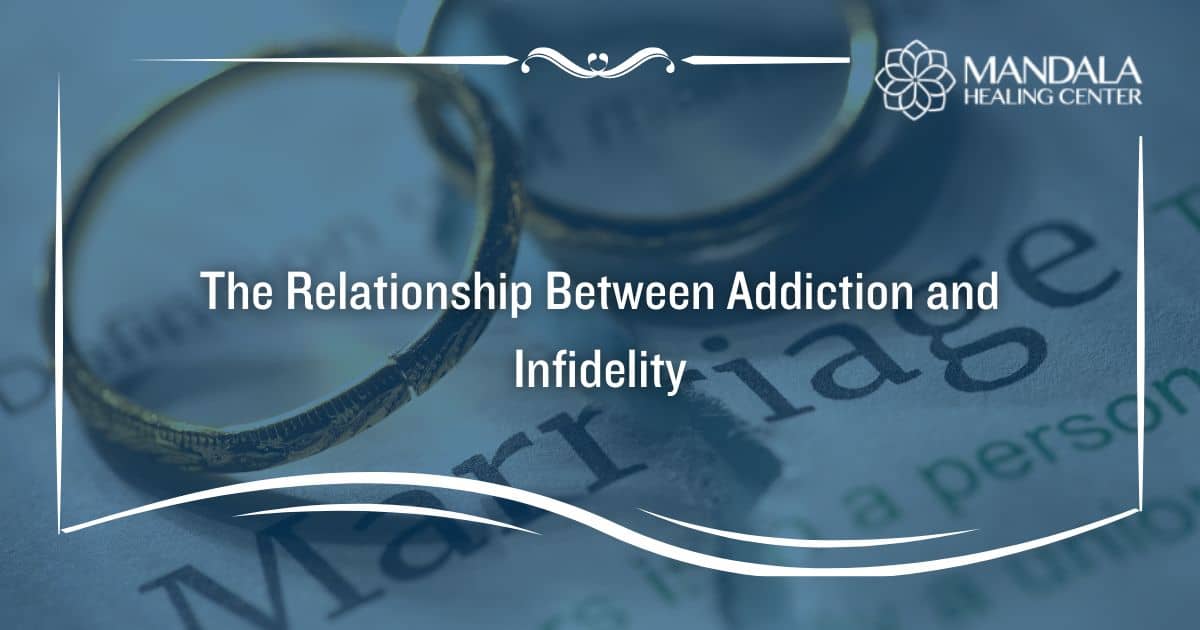Infidelity is common among committed partners in the United States. According to a recent survey, 20-40% of men and 10-25% of women will cheat on a partner in their lifetime.[1] It is often a complex problem that can be caused by several factors.
Addiction causes severe harm to a person’s health, emotional well-being, and relationships. Many addiction and mental health experts believe there is a strong link between addiction and infidelity. Substance abuse may lead to infidelity, and cheating can cause or worsen substance abuse or addiction. People dealing with addiction and infidelity may get caught in a harmful cycle that feels impossible to escape.
Exploring the connection between addiction and cheating can help you identify problematic patterns or issues in your own life and seek the help you need to overcome them. Reach out to the team of specialists at the Mandala Healing Center to explore our holistic addiction programs or to find support during your recovery journey.
Understanding the Connection Between Addiction and Infidelity
Each person in a relationship may have their own idea about what is and is not considered cheating. It’s important for partners to communicate their ideas and boundaries to avoid harming each other.
Some examples of infidelity include:
- Sexual behaviors with someone outside of the relationship
- Attending events or spending time with someone outside of the relationship
- Giving or receiving emotional support to someone outside of the relationship
- Having sexual or emotional fulfillment with a person outside of the relationship
- Spending a lot of money or time with someone outside of the relationship
Generally, any action or behavior that damages the trust within a relationship may be considered cheating. Infidelity often erodes the security, safety, and comfort within a relationship.
There are many theories about why infidelity may develop in a relationship. Substance abuse and addiction can play a role in infidelity, and infidelity can lead to substance abuse. Here are some theories about the connection between addiction and cheating.
People may cheat while intoxicated
Drinking and using drugs can change the way a person thinks and behaves. Many substances–particularly alcohol– affect people’s judgment and inhibitions, leading them to say and do things they usually wouldn’t. For example, someone may consider cheating on their partner when sober and follow through while intoxicated.
People use substances to manage emotions
Cheating can cause a severe rift in a relationship and cause stress to skyrocket. The betrayed partner may feel hurt, sad, angry, or worthless.[2] They may develop low self-esteem, anxiety, or depression as a result of their partner’s infidelity. In some cases, they may use drugs or alcohol to dull the emotional pain of their partner’s affair. In time, this self-medication can develop into an addiction to substances.
People may cheat to escape
Addiction often has disastrous consequences in a relationship. Substance abuse can cause people to do and say things they normally wouldn’t. An addicted partner may be hostile, cold, aggressive, or even violent while intoxicated–and their partner may feel the need to escape. Partners of addicted people may seek warmth, love, and safety from other people, and this can lead to infidelity.
While infidelity is a highly personal and complex issue, it’s clear that substance abuse and addiction can strain even the most loving relationships and damage trust. Treating substance abuse and giving people the skills to heal their relationships is essential.
Treating Addiction and Cheating
It’s important to recognize the signs of substance abuse and seek comprehensive treatment as soon as you need it. Getting the right treatment can help you address the physical, emotional, and behavioral aspects of your addiction and give you the tools to improve your communication and relationships.
Addiction treatment plans should include evidence-based and holistic therapies to help people identify and heal the underlying roots of their addiction and move forward into a healthier future. Treatments include:
- Individual counseling
- Family or relationship counseling
- Group therapy
- Medications
- Mental health care
- Relapse prevention education
- Aftercare planning
- Holistic care, including exercise, nutrition support, mindfulness, and more
Relationships counseling is important to couples affected by addiction and infidelity. Partners can learn about addiction and recovery, identify destructive patterns and enabling behaviors, and learn to communicate and set boundaries more effectively. In many cases, treating addiction and infidelity can make it possible to repair a relationship and move forward together.
Find Help Now
If you or someone you love needs support to treat addiction and infidelity, reach out to the caring specialists at the Mandala Healing Center now. Living with addiction can harm your health, well-being, and relationships–but compassionate, comprehensive treatment can help you get back on the right track.
Don’t wait for another day to pass by without getting the help you need. You can learn the skills and find support to heal your body, mind, and relationships. Call us today to take the first step of your recovery journey.
References:
- Live Science: Political Digs Aside, How Common is Infidelity, Really? Retrieved June 2023 from https://www.livescience.com/56407-how-many-people-cheat.html
- National Library of Medicine: Illicit Drug Use and Marital Satisfaction, Retrieved June 2023 from https://www.ncbi.nlm.nih.gov/pmc/articles/PMC2259284/












